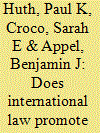|
|
|
Sort Order |
|
|
|
Items / Page
|
|
|
|
|
|
|
| Srl | Item |
| 1 |
ID:
132325


|
|
|
|
|
| Publication |
2014.
|
| Summary/Abstract |
This article examines compliance with international laws prohibiting the intentional targeting of noncombatants in interstate war, specifically focusing on the role of third-party states in enforcement. We argue that the expectation of third-party coercion, when sufficiently high, can induce war participants to comply with this body of law. We identify the conditions under which combatant states will anticipate a high likelihood of coercion, demonstrating that third-party states are most likely to coerce combatants when they have both the willingness and opportunity to do so. Democratic third parties that value the rule of law and human rights possess the willingness to coerce war participants, while strong allies, trade partners, and intergovernmental organization (IGO) partners with existing ties to the combatant state have the opportunity to engage in coercion by linking combat-ant behavior to the provision of benefits or imposition of costs. Based on this logic, we hypothesize that war combatants who have ratified the Geneva/Hague Conventions prohibiting the intentional targeting of noncombatants during war are more likely to comply with the legal obligations included in those conventions when they interact with relatively strong democratic alliance, trade, and IGO partners. In a series of quantitative tests on a data set of all interstate wars from 1900 to 2003, we find strong statistical and substantive support for the role of third parties in inducing compliance with the law.
|
|
|
|
|
|
|
|
|
|
|
|
|
|
|
|
| 2 |
ID:
157363


|
|
|
|
|
| Summary/Abstract |
Why do some postconflict states return to violence, while others remain at peace? Analysts increasingly credit postconflict justice institutions—such as truth commissions, amnesties, reparations, and trials—with contributing to the prevention of conflict recurrence following civil wars. But scholars remain divided about the overall effectiveness of these varied institutions. In this article, we directly engage this debate. We seek to overcome theoretical and data limitations that make it difficult to address the relationship between justice institutions and the likelihood that conflict will recur. We find that only postconflict justice processes that lessen conflict-induced grievances, and thus address individual motivations to rebel, are successful at keeping the peace. In a series of statistical tests using new data on postconflict justice from 1946 to 2006, we find strong support for the role of motivation-addressing processes in reducing conflict recurrence.
|
|
|
|
|
|
|
|
|
|
|
|
|
|
|
|
| 3 |
ID:
110537


|
|
|
|
|
| Publication |
2011.
|
| Summary/Abstract |
In this article, we explain the role of international law in the resolution of territorial disputes from 1945 to 2000. In doing so, we focus on three outcomes of interest. First, when do states choose to revise the territorial status quo through negotiations instead of force? Second, when are states able to reach a final settlement? Third, when do states prefer a process of legal dispute resolution (i.e., adjudication or arbitration) to bilateral negotiations? To answer these questions, we argue that when the legal principles relevant to the dispute are unambiguous and clearly favor one side, a law-based focal point will emerge. This focal point, in turn, facilitates the settlement process by helping leaders overcome distribution problems, a central obstacle in reaching a final agreement. We find strong and consistent empirical support for our hypotheses regarding international law and peaceful dispute resolution.
|
|
|
|
|
|
|
|
|
|
|
|
|
|
|
|
| 4 |
ID:
117594


|
|
|
|
|
| Publication |
2012.
|
| Summary/Abstract |
Post-conflict states represent an important research agenda for scholars studying foreign direct investment (FDI). While leaders of post-conflict states have strong incentives for trying to attract international investments, multinational corporations (MNCs) may view these states as high-risk since the reoccurrence of violence in the aftermath of civil conflict is common. Consequently, leaders of post-conflict states desperate to receive FDI to help ignite their stalled economies must convince MNCs that their state is a stable and secure place to invest in. Drawing on the recent literature that identifies the importance of domestic and international institutions for securing FDI, this article argues that post-conflict justice (PCJ) institutions can help post-conflict states attract investment. The domestic and reputation costs associated with implementing PCJ allow states to send a costly and credible signal to international investors about the state's willingness to pursue the successful reconstruction of the post-conflict zone. Under these conditions, uncertainty is lessened and foreign investors can feel more confident about making investments. Post-conflict states, therefore, that choose to implement PCJ are more likely to receive higher levels of FDI compared with post-conflict states that refrain from implementing these institutions. Statistical tests confirm the relationship between justice institutions and FDI from 1970-2001. Post-conflict states that implement restorative justice processes in the post-conflict period receive higher levels of FDI than those countries that do not implement a process.
|
|
|
|
|
|
|
|
|
|
|
|
|
|
|
|
| 5 |
ID:
157507


|
|
|
|
|
| Summary/Abstract |
The International Criminal Court (ICC) is responsible for prosecuting crimes against humanity, war crimes, and genocide. Despite the potential for the ICC to deter human rights abuses, scholars and policy makers are divided on the effectiveness of it. This debate, however, is plagued by some important theoretical and empirical limitations. I address the problems in the literature and evaluate whether the ICC can prevent human rights abuses. I argue that the ICC can deter governments from committing human rights violations by imposing a variety of costs on them throughout their investigations that decrease their expected payoffs for engaging in human rights abuses. Across a variety of statistical estimators that account for standard threats to inference and several anecdotes, I find strong support for my theoretical expectations; leaders from states that have ratified the Rome Statute commit lower levels of human rights abuses than nonratifier leaders.
|
|
|
|
|
|
|
|
|
|
|
|
|
|
|
|
|
|
|
|
|